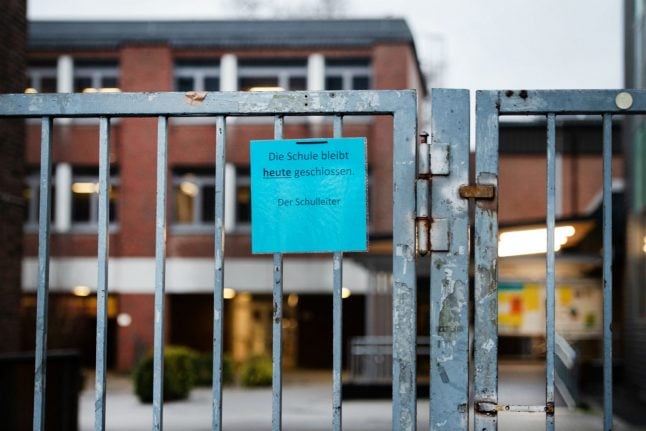On Tuesday evening, two new cases of the coronavirus were confirmed in Baden-Württemberg and North Rhine-Westphalia – both marking the first incidents in the two western states.
An additional three cases case was confirmed on Wednesday afternoon: one in North Rhine-Westphalia and two in Baden-Württemberg.
The condition of the first coronavirus patient in North Rhine-Westphalia remained critical as of Wednesday, according to a Ministry of Health spokesperson.
On Monday, the 47-year-old man – who showed symptoms of severe pneumonia – was admitted to a hospital in the Heinsberg district near Aachen and isolated in the intensive care unit.
READ ALSO: How concerned should German residents be about the spread of the coronavirus?
On Tuesday evening, he was brought to the university hospital in Düsseldorf. The patient suffers from a pre-existing condition.

A man with an umbrella stands outside the hospital Wednesday where the first two coronavirus patients in North Rhine-Westphalia are being treated. Photo: DPA
The man had reportedly been in contact with an acquaintance who had recently been in China on business, according to local newspaper Aachener Zeitung.
On Wednesday afternoon, it was also confirmed that the wife of the man had been infected with the virus, said the hospital in a statement.
As a precautionary measure, schools and kitas in the Heinsberg district, as well as all public offices, were to close on Wednesday.
The kindergarten in which the man's wife works in the small municipality of Gangelt was also to remain closed for an undetermined amount of time.
Returnee from Milan
The patient from Baden-Württemberg is a 25-year-old man from the district of Göppingen, about 40 kilometres away from Stuttgart, according to the state health ministry on Tuesday. He is reported to have contracted the disease during a trip to Milan.
After his return home, the patient had fallen ill with flu-like symptoms and had contacted the local health department. He was to be isolated and treated in a clinic on Tuesday evening.
On Wednesday afternoon, two additional coronavirus cases were also confirmed: a 24-year-old woman from nearby Tübingen and her father. The girl is reportedly a friend of the infected traveller.
In Germany, the first infections with coronavirus had mostly occurred at a company in Bavaria, but also among returnees from Wuhan. However, these cases did not lead to further known infections.
READ ALSO: Coronavirus in Bavaria: How the German state is dealing with the spread of the virus
Following the two confirmed coronavirus cases in Baden-Württemberg and North Rhine-Westphalia, local authorities are discussing how to proceed.
Talks are planned for Wednesday to assess the situation and plan the next steps, a spokesperson for the Ministry of Health in North Rhine-Westphalia told dpa early Wednesday morning.
The Ministry of Health in Baden-Württemberg could not yet be reached for a statement.



 Please whitelist us to continue reading.
Please whitelist us to continue reading.
Member comments